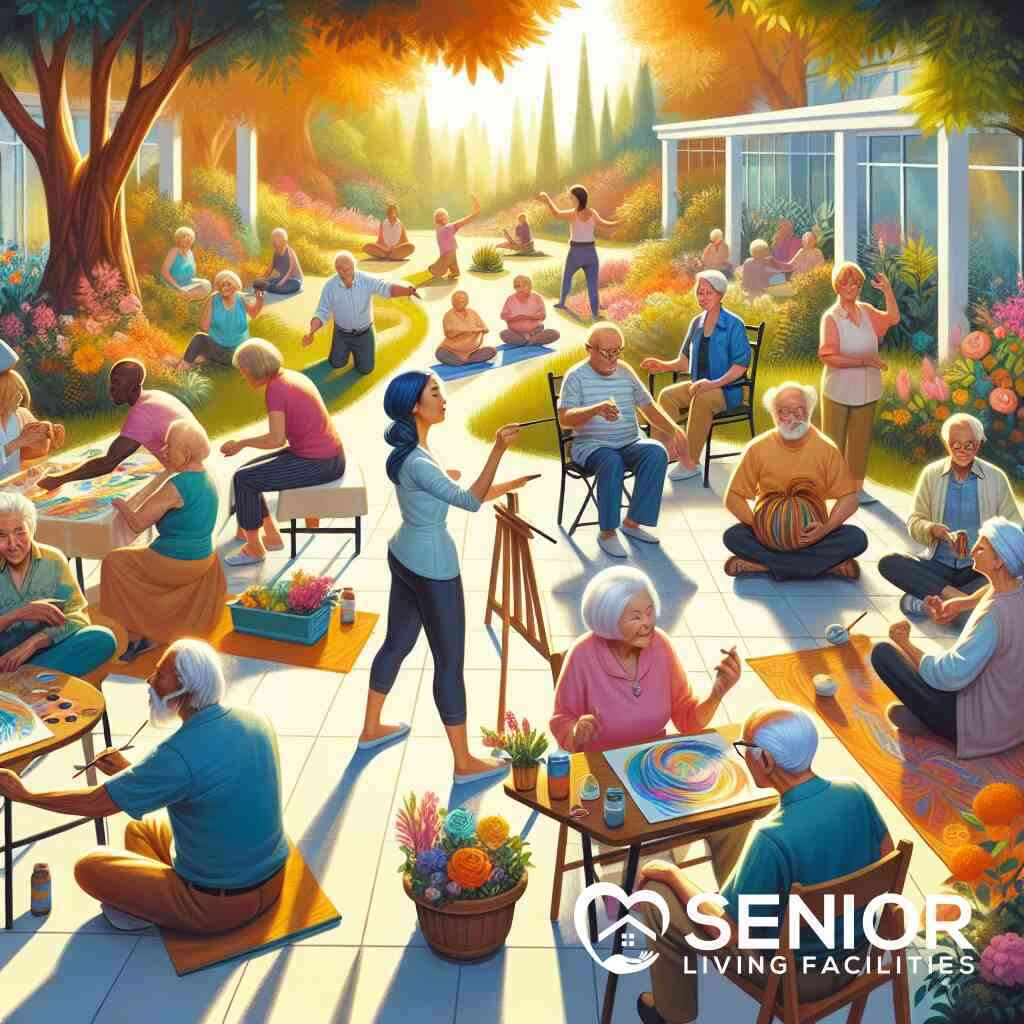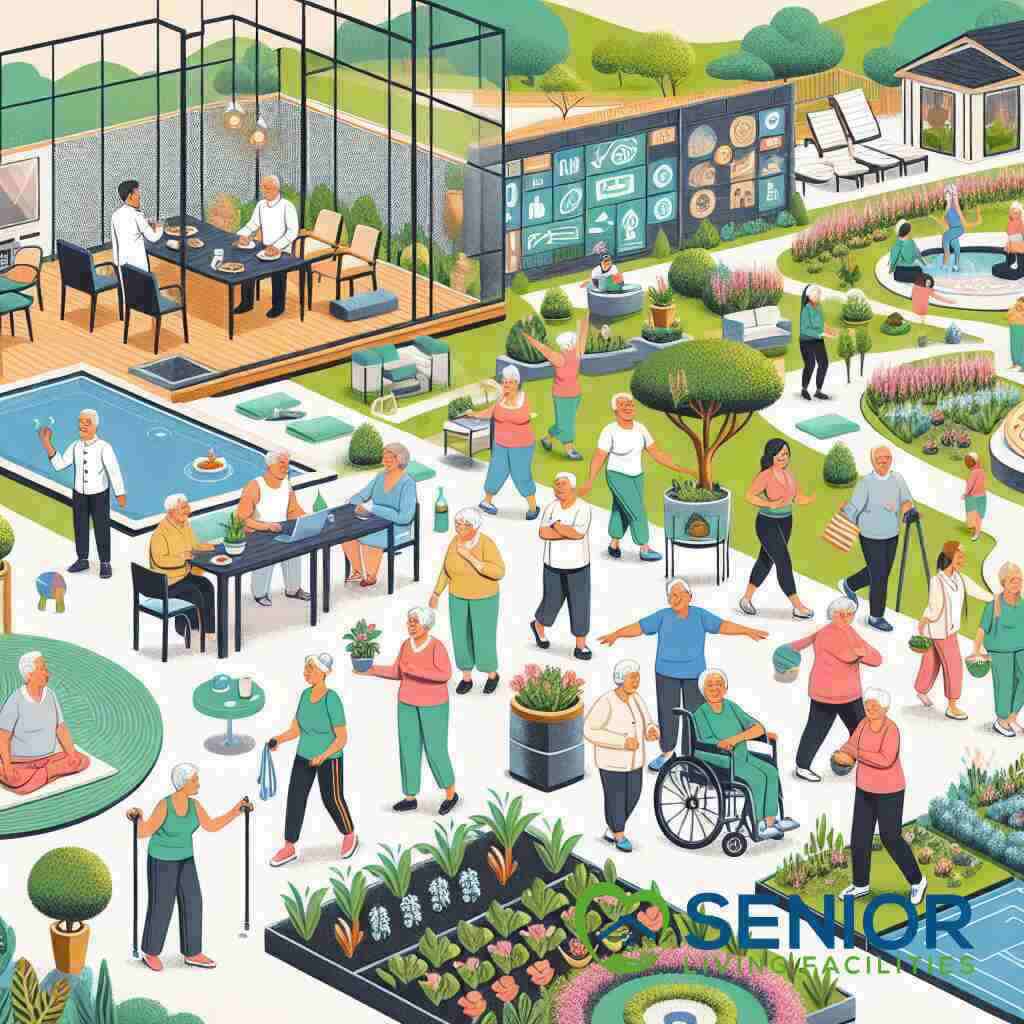
Best Practices for Nutritional Excellence in Senior Communities
February 13, 2025
An Inviting Introduction to Nutritional Excellence in Senior Communities
Understanding the Imperative of Senior Nutrition
The significance of senior nutrition resonates profoundly within senior communities, where the physiological changes associated with aging necessitate a reevaluation of dietary needs. Nutrition is not merely a component of health-it is a cornerstone of well-being and longevity. As individuals age, their nutritional requirements shift, underscoring the need for senior nutrition best practices. Addressing these needs can lead to improved health outcomes and heightened quality of life within senior living environments.
Exploring the Senior Living Facilities Vision for Wellness
At Senior Living Facilities, we strive to present an integrated approach that dovetails nutrition with overall wellness. Our vision underscores the creation of environments that fulfill both physical and psychological needs, fostering spaces where seniors feel supported and nurtured. By prioritizing nutritional excellence in senior communities, we are committed to providing sustainable solutions that facilitate healthful living. Our platform is designed to cater to a myriad of preferences, ensuring residents feel valued and connected within their community.
Setting the Stage: Nutritional Needs Amid Aging
Aging is accompanied by a unique set of challenges, making the role of nutrition pivotal in maintaining vitality and independence. Nutritional needs evolve, demanding a focus on nutrient density, balanced intake, and the minimization of health risks such as hypertension or diabetes. Understanding these shifts allows for the creation of effective dietary strategies tailored specifically to the needs of seniors. This emphasis on meal planning for the elderly plays a crucial role in supporting both physical health and mental acuity. Achieving nutritional health in senior living involves an appreciation of these subtleties, setting the stage for proactive engagement with residents’ dietary requirements.
Foundations of Nutritional Excellence
Key Nutritional Components for Aging Healthfully
An optimal diet for seniors must encompass a blend of essential nutrients, reflecting the intricacies of aging physiology. Vital components include adequate protein to preserve muscle mass, calcium, and vitamin D to fortify bones, and omega-3 fatty acids to support cardiovascular health. Fiber-rich foods are critical, assisting in digestion and preventing issues like constipation. Hydration, often underemphasized, is paramount as seniors are more prone to dehydration. Together, these components form a holistic framework for healthy aging through diet, emphasizing the need for balanced meals for older adults.
Bridging Knowledge Gaps with Nutrition Education for Seniors
Education stands as a pillar in translating nutritional guidelines into practical regimes that seniors can follow daily. Offering comprehensive nutrition education for seniors empowers them to make informed food choices and recognize the significance of meal timing and portion control. Workshops and personalized guidance can demystify nutritional labels, promoting a reduction in sodium and sugar intake. Bridging these knowledge gaps lays a foundation for healthier habits, reinforcing the correlation between informed choices and improved well-being in senior living.
From Margins to Center: Elevating the Role of Nutrition in Communities for Seniors 55+
Nutrition in communities for seniors 55+ must transcend traditional bounds to become a central aspect of communal life. Integrating dietary considerations into every facet of community planning fosters an environment where nutritional health thrives. Community-driven initiatives, such as communities’ nutrition strategies, boost engagement and interaction, creating vibrant hubs for dietary education and meal experiences. Shifting nutrition from the margins to the forefront encapsulates a forward-thinking approach, ensuring that food services are attuned to evolving needs and preferences, ultimately promoting healthier diets for seniors.
Designing Senior-Optimized Meal Plans
Expertly Crafted Diet Plans for Older Adults
In the pursuit of nutritional excellence in senior communities, expertly crafted diet plans are essential. These plans prioritize nutrient-dense foods tailored to the unique requirements of older adults. By integrating a variety of fruits, vegetables, lean proteins, and whole grains, these diets aim to provide comprehensive nourishment that supports longevity. Furthermore, individual preferences and cultural backgrounds are considered, ensuring meals are both appealing and familiar. Guide to Unveiling Luxury in Senior Living Facilities Today As seniors’ dietary needs evolve, such meticulously designed plans can greatly enhance meal quality and satisfaction within senior living facilities.
Integrating Senior Wellness through Diet Planning
Integrating wellness into diet planning is a pivotal aspect of promoting holistic health among seniors. How to Maximize Daily Wellbeing in Senior Living Facilities It involves a synchronized approach where nutritional guidelines interlace with the overall wellness goals of the senior community. This includes creating meal plans that not only meet dietary needs but also align with health conditions prevalent among seniors, such as diabetes and hypertension. Additionally, fostering a supportive environment through community dining initiatives can elevate engagement and social interactions, further promoting a sense of belonging. These strategies underscore the importance of a comprehensive approach to nutritional health in senior living.
Exploring Thematic Meals and Seasonal Variability in Diet Plans
The exploration of thematic meals and embracing seasonal variability can transform dining experiences for seniors. Themed meals, spanning from international cuisine days to seasonal harvest celebrations, can introduce variety and excitement. This approach not only enriches the dining atmosphere but also enhances nutrient intake by incorporating seasonal produce packed with peak flavor and nutritional value. Such diversity in meal offerings caters to preferences while coaxing seniors to venture into fresh culinary experiences, thereby fostering healthier diets for seniors and supporting long-term well-being.
Innovative Approaches to Senior Dining Solutions
Creating Senior Community Dining Strategies
Innovative dining strategies are crucial in senior living facilities to cater to the diverse dietary needs and preferences of residents. Establishing communal dining experiences encourages social interaction and enhances the overall quality of life for seniors. By implementing versatile dining schedules and meal options, facilities can promote enhancing senior community meals. Incorporating resident feedback into meal planning ensures continuous improvement and satisfaction. Additionally, organizing themed dining events fosters a sense of community, offering both nutrition and enjoyment in shared culinary experiences.
To create effective dining strategies, it is essential to focus on the unique nutritional requirements of older adults while considering their personal tastes and cultural backgrounds. Involving seniors in menu selection and dining-related decisions empowers them, making mealtime a collaborative and enjoyable activity. This strategy not only supports nutritional excellence in senior communities but also strengthens the bonds among residents, contributing to their overall well-being.
Balancing Accessibility with Variety in Senior Meals
In the pursuit of healthier diets for seniors, balancing accessibility with variety is key to ensuring that meals cater to diverse nutritional needs. Accessibility concerns, such as mobility limitations or dietary restrictions, must be addressed by providing a range of meal options that accommodate different needs seamlessly. Offering a diverse menu not only meets dietary requirements but also helps maintain residents’ interest in food and promotes their nutritional health.
To enhance meal accessibility, facilities can employ flexible dining schedules and adaptive dining spaces that cater to varying physical capabilities. Furthermore, technology can play a vital role in customizing meal preferences and managing dietary restrictions efficiently. By creating a dining environment that embraces variety yet remains accessible, senior living communities can significantly enhance the dietary experience, supporting both meal planning for the elderly and satisfying culinary preferences.
Innovations in Food Services for Senior Wellness
Embracing innovations in senior meal services allows senior living facilities to offer cutting-edge solutions that enhance both the nutritional value and the dining experience. The integration of modern technology, such as digital menu boards and nutrition tracking apps, facilitates personalized meal suggestions and feedback opportunities. This approach enhances dietary management and promotes meal quality improvement within senior communities.
Investing in innovative food services also includes exploring sustainable and locally sourced ingredients, which support both environmental responsibility and fresher meal options. Collaborating with culinary experts, dietitians, and food service providers ensures that senior meals are not only nutritious but also appealing and varied. By adopting these innovative practices, senior living environments can consistently meet the evolving dietary needs and preferences of their residents, ultimately paving the way for more effective supportive nutrition for seniors. The Complexities of Cognitive Wellness in Senior Living Facilities
To foster wellness, it is crucial to continually evaluate and refine these innovative practices, ensuring the adaptation to emerging dietary trends and health requirements. Consequently, senior living facilities can maintain a proactive stance in delivering high-quality nutrition and exceptional dining experiences to their residents.
Ensuring Consistent Nutritional Assessment and Feedback
Real-time Assessments and Adaptations in Senior Dietary Needs
In senior living facilities, the role of individualized dietary assessments cannot be overstated. Real-time health and nutrition evaluations are essential for identifying and adapting to the ever-changing dietary needs of elderly residents. By establishing a mechanism for continuous evaluation, facilities can swiftly address any nutritional deficiencies or health issues that arise. This process ensures seniors receive the exact nutrients they need for optimal health and well-being. Regular check-ins with healthcare professionals, coupled with detailed nutritional tracking, provide a robust framework for dietary management for seniors seeking the most personalized care. What is the Role of Tech in Modern Senior Living Facilities?
Harnessing Technology for Dietary Management in Elderly
Harnessing modern technology in dietary management for seniors represents a quantum leap in enhancing nutritional care. Senior living communities can leverage dietary apps, digital meal planners, and health monitoring devices to streamline meal planning and nutrient tracking. These technologies facilitate efficient communication and record-keeping, allowing dietitians to tailor meal plans precisely to individual needs. By automating routine assessments, facilities can focus more resources on enriching senior living experiences, thereby facilitating innovations in dietary management for seniors.
Feedback Loops and Continual Improvement in Meal Quality
A commitment to sustained quality in senior meals necessitates establishing effective feedback mechanisms. Resident feedback plays a crucial role in refining food services and enhancing meal satisfaction. Tailoring meals based on resident preferences and nutritional requirements drives meal quality improvement. By incorporating regular surveys, focus groups, and suggestion boxes, senior living facilities can gather valuable insights for continual improvement. This approach ensures that menus remain contemporary, appealing, and nutritious, ultimately promoting wellness among seniors and maintaining high standards of nutritional excellence.
A Conclusion Empowered by Development and Impact
Reflecting on Enhanced Senior Health Through Diet
Embracing best senior nutrition practices has facilitated transformative changes in senior communities, greatly enhancing the health and well-being of older adults. By prioritizing nutrient-rich diets, we have witnessed remarkable improvements in energy levels, cognitive function, and overall quality of life. Proactive meal planning for the elderly, tailored to individual health conditions and preferences, has proven essential in addressing the unique nutritional demands of aging adults. These achievements illustrate the profound impact of carefully curated dietary strategies, demonstrating that a focus on nutritional excellence in senior communities can yield extraordinary benefits for both individuals and communities at large. Understanding Senior Living Facilities in 2024
Realizing the Future of Senior Living Facilities Nutrition Services
Looking ahead, the future of nutrition services in senior living is promising and dynamic. By leveraging technological advancements and innovative culinary practices, senior communities can continue to refine and elevate their dining offerings. Innovations in senior meal services, such as personalized meal plans and interactive dining experiences, are paving the way for more engaging and health-promoting environments. Investing in food services in senior wellness supports the cultivation of vibrant communal atmospheres, enabling residents to enjoy diverse, delicious, and healthy meals. As we advance, it is crucial to maintain a forward-thinking approach, constantly evolving and adapting to the changing dietary landscape and needs of seniors.
Our Ongoing Commitment to Nutritional Health in Senior Living
At Senior Living Facilities, our commitment to advancing nutritional health in senior living communities remains unwavering. We are dedicated to ensuring that every resident receives supportive nutrition for seniors, fostering an inclusive environment where dietary needs are met with compassion and expertise. By continuously refining our offerings and embracing contemporary nutritional insights, we aim to be at the forefront of senior care innovation. Our dedication to enhancing senior diets in communities through exceptional nutrition services underscores our mission to support healthy aging and enrich the lives of seniors across the nation. Patience and resilience guide our efforts as we work toward a future where every senior enjoys optimal health and well-being through diet and nutrition.
Frequently Asked Questions
Question: How do Senior Living Facilities incorporate senior nutrition best practices into the communities for seniors 55+?
Answer: Senior Living Facilities is dedicated to advancing nutritional excellence in senior communities by ensuring that each facility employs the latest senior nutrition best practices. What Are the Unseen Benefits of Senior Living Facilities? Our detailed approach includes crafting balanced meals for seniors that focus on nutrient density and cater to evolving dietary needs. We emphasize engaging the residents with themed meals and seasonal variety, offering a diverse culinary experience that supports healthy aging through nutrition. Additionally, our facilities implement ongoing nutrition education for seniors, ensuring they make informed decisions about their dietary health.
Question: In the context of Best Practices for Nutritional Excellence in Senior Communities, how do Senior Living Facilities ensure meal quality for older adults?
Answer: At Senior Living Facilities, we prioritize high meal quality in senior facilities by closely aligning our dining services with the nutritional needs of older adults. We realize the importance of expertly crafted diet plans for older adults that ensure comprehensive nourishment and satisfaction. By routinely gathering feedback from our residents, we can fine-tune our meal offerings to meet their preferences while maintaining nutritional excellence. What Are Must-Know Details About Senior Living in 2024? Additionally, innovative strategies such as integrating senior community dining initiatives foster social interaction and enhance overall well-being, exemplifying our commitment to optimizing senior health with diet.
Question: Can you explain how Senior Living Facilities support individualized dietary management for older adults?
Answer: Senior Living Facilities understands that every resident has unique dietary requirements. We support individualized dietary management for older adults by employing personalized meal planning that aligns with specific health conditions and preferences. Our facilities utilize modern technology to streamline dietary tracking and feedback processes, allowing us to adapt to each resident’s needs continuously. Regular assessments ensure our residents receive supportive nutrition for elderly individuals tailored to their specific wellness goals, ensuring their dietary needs are always met with precision and care.
Question: What role does nutrition education play in promoting healthy eating for seniors at Senior Living Facilities?
Answer: Nutrition education is a cornerstone of our approach at Senior Living Facilities, empowering residents to embrace healthy eating for seniors. We provide comprehensive resources and workshops that educate seniors on the importance of balanced meals and informed food choices. By demystifying nutritional labels and promoting reduced sodium and sugar intake, we help residents develop sustainable healthy habits. Educating our community enables individuals to take charge of their nutritional health, enhancing their overall well-being and aligning with our mission of promoting healthier diets in seniors. Top Insights into Senior Living Communities for Modern Seniors
Question: How do Senior Living Facilities ensure consistent nutritional assessment and feedback for enhancing senior diets in communities?
Answer: Consistent nutritional assessment and feedback are integral to our process at Senior Living Facilities. Our facilities employ real-time evaluations and adapt meal plans based on current health assessments to ensure optimal nutrition for all residents. Advanced technologies enable ongoing monitoring of dietary intake and preferences, allowing us to maintain high standards in meal quality improvement. By actively engaging with residents through surveys and feedback loops, we further enhance meal experiences while continually refining our practices to support nutritional health in senior living. Top 10 Questions Answered About Senior Living Near You




